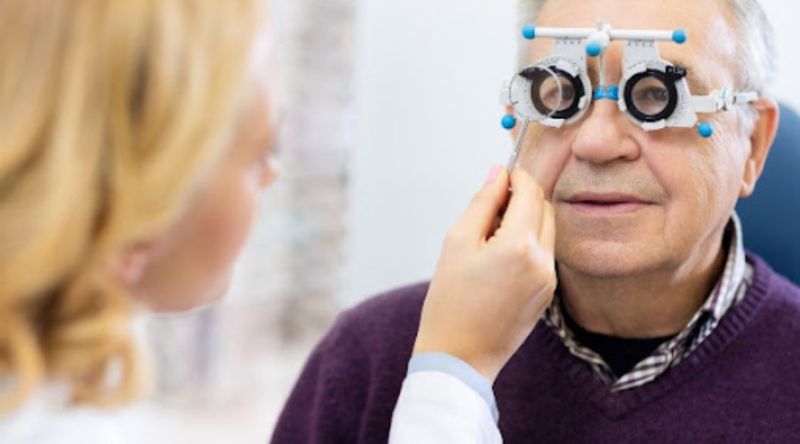
Eye care services are essential in every stage of life, but especially for seniors. The risk of eye diseases and vision loss is higher in the older years of life. As a result, older adults often need more services from eye care providers.
It’s no surprise that eyes worsen with age due to genetics and daily activities. At this age, it’s more important than ever for a senior to receive appropriate eye care services so they can enjoy the most thriving, vibrant lifestyle.
Here are a few things to consider if you are trying to choose the ideal eye care services for yourself or an aging loved one.
According to the National Institute on Aging, adults over the age of 50 should have annual eye exams with dilation. Even if you don’t wear vision correction lenses and feel like you have healthy eyes, it’s still essential to maintain these regular checkups.
Certain circumstances might merit eye exams more frequently. For example, patients with high blood pressure or diabetes have a higher risk of certain eye diseases. So, they might need to visit an ophthalmologist more frequently to monitor their vision.
Regular eye exams with an experienced ophthalmologist are the only way to diagnose common eye diseases. This process is essential to catch common issues in the earliest stages – when they are the easiest to treat. With early intervention, it might be possible to avoid unnecessary vision loss.
Optimal eye health is a factor that affects both physical health and mental health. Certain life changes in retirement can often be avoided if the senior maintains a good vision.
If a senior has a serious eye condition, it can take a toll on every other part of life. Eventually, vision loss has a negative impact on independence and overall functionality.
For example, a fall can have severe consequences for a person’s life and wellness. Many times, the fall could have been avoided if the person had had better vision.
Additionally, good vision can improve a person’s independence because they can continue driving without assistance. These details might seem small, but they have a notable impact on the person’s overall quality of life.
An estimated one in three adults experiences vision issues by the age of 65. Blurry vision can be temporary or permanent, depending on the cause of these vision problems.
The most common causes of blurry vision in seniors include:
Even though vision loss is common with age, it doesn’t mean that all seniors must live with reduced vision. Lifestyle habits and modern medical treatments make it possible to protect and restore vision. Consider these important tips for protecting vision in the later years of life.
We’ve all heard that carrots help protect the eyes. It’s true that certain foods are rich in antioxidants, lutein, and beta-carotene, which have a protective impact on your vision. Eat eye-healthy foods that contain essential vitamins and minerals, such as:
While these foods won’t reverse vision loss, they can be part of a healthy lifestyle that reduces the risk of certain health conditions. For example, eating a healthy diet minimizes the risk of diabetes, which also helps to reduce the likelihood of severe eye conditions.
When you are enjoying a beautiful day outside, make sure you protect your eyes from the sunlight. Direct sunlight exposure can cause damage and increase the risk of certain eye diseases.
Wear sunglasses with UV protection. Also, consider using a hat to keep your eyes shaded. If you wear prescription glasses, then talk to your ophthalmologist about prescription sunglasses to maintain optimal vision and protect from sun exposure at the same time.
Staring at a computer screen or cell phone for too long can take a toll on your eyes. As you start to have eye strain from screen time, you might notice a temporary change in vision.
Taking regular breaks from the computer screen is one of the best ways to avoid eye strain. So if your eyes are feeling tired, switch up your routine to include activities that don’t involve a computer, cell phone, or television.
It might seem unrelated that going for a walk or attending a fitness class can affect your eyes. But exercise is indeed an essential step to improve blood flow, which can benefit every part of the body.
When you are supporting circulation, it optimizes the amount of oxygen moving through your eyes. Additionally, healthy blood flow delivers essential nutrients to the cells.
Any type of exercise is beneficial. If you aren’t already in a regular exercise routine, start with light activities such as yoga, walking, or swimming. Work with your doctor to determine the ideal fitness level based on your overall health.
Every healthcare provider will agree that smoking is a bad habit that takes a toll on your health. Smoke affects all the organs in your body, including your heart, lungs, and eyes.
If you are smoking, consider a cessation program to break the habit. Smoking increases the risk of many types of eye diseases, which is why cessation is often one of the top recommendations from ophthalmologists and primary care physicians.
Don’t wait until you have significant vision loss before talking to an ophthalmologist. Regular eye exams are a simple solution for staying on top of your health and catching potential issues in the earliest stages.
When you visit an eye doctor for a dilated eye exam, they can check for common age-related eye diseases. Catching these degenerative diseases in the earliest stages is important for minimizing vision loss.
Additionally, eye exams can help uncover other health problems. For example, changes in your eyes could indicate high cholesterol, hypertension, or diabetes.
Is it time for your annual eye exam? Reach out to our team at EyesNY to schedule an appointment. We take a proactive approach in partnering with our patients, helping them maintain optimal vision through lifestyle changes and various treatments.
You can schedule an appointment at one of our nearby locations. Call any time if you need more information about these services. Call us at (518)-791-5725.
Malta
658 Malta Ave., Ste 101
Malta, NY 12020
Phone: (518) 580-0553
Saratoga Springs
414 Maple Ave Ste 200
Saratoga Springs, NY 12866
Phone: (518) 580-0553
Clifton Park
1712 U.S. 9
Clifton Park, NY 12065
Phone: (518) 580-0553
Queensbury
535 Bay Road
Queensbury, NY 12804
Phone: (518) 580-0553
Troy
2200 Burdett Street Ste 206
Troy, NY 12180
Phone: (518) 580-0553
